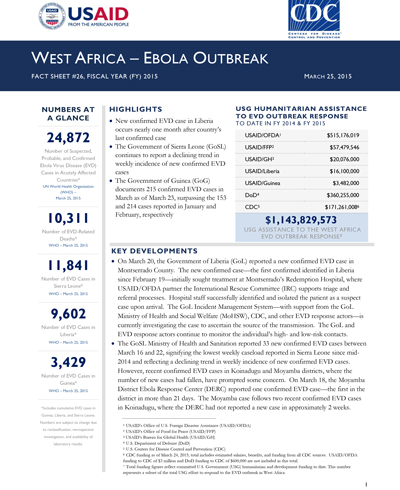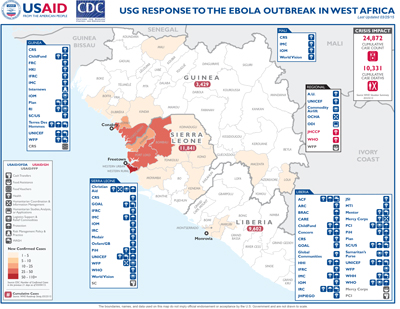Speeches Shim
March 31, 2015
HIGHLIGHTS
Ebola Response
Visit our main West Africa Ebola Outbreak page to learn more about how we're responding to the West Africa Ebola outbreak, and what you can do to help.
- Last confirmed EVD case dies in Liberia; no new confirmed cases detected since March 20
- Sierra Leone’s three-day stay-at-home period occurs with widespread compliance
- President of Guinea Alpha Condé declares a 45-day health emergency period; closes border between Guinea and Sierra Leone
West Africa Ebola Outbreak Fact Sheet #27 (FY 15) ![]() (pdf - 300k)
(pdf - 300k)
KEY DEVELOPMENTS
- The Government of Sierra Leone (GoSL) enacted a three-day stay-at-home period on March 27–29. Approximately 8,300 three-person teams—each comprising a nurse, a social mobilizer, and a community task force member—went door-to-door to distribute soap, promote good hygiene practices, and identify possible EVD cases. The GoSL National Ebola Response Center (NERC) reported that teams focused on EVD hotspot areas and did not deploy to four districts that have no current active transmission chains. To date, the NERC has not presented definite EVD-related data resulting from the stay-at-home period.
- In order to combat growing numbers of confirmed EVD cases, on March 28 President Alpha Condé of Guinea declared a 45-day health emergency period in Boffa, Coyah, Dubréka, Forécariah, and Kindia districts, as well as the capital city of Conakry, allowing EVD response actors to strengthen EVD response efforts. The declaration provides local Government of Guinea (GoG) officials greater authority to restrict population movements and requires that all dead bodies be systematically tested and buried in a safe and dignified manner. President Condé indicated that individuals who hide EVD-positive persons or persons not part of EVD response burial teams
REGIONAL
On March 26, the Eastern and Southern African Trade and Development Bank pledged $50,000 for a capacity-building grant to the Africa Against Ebola Solidarity Trust (AAEST). In partnership with the African Union (A.U.), AAEST—a charitable trust established to raise funds for training, equipping, and deploying African health workers in the fight against EVD—is aiming to build long-term local health capacity. The funds will support the establishment of the African Centers for Disease Control and Prevention, which will strengthen the response to future public health emergencies in Africa.
West Africa Ebola Map #27 March 31, 2015 ![]() (pdf - 524k)
(pdf - 524k)
Liberia
EVD response actors continue to investigate possible contacts related to the most recent EVD case in Liberia, who died on March 27 at the Monrovia Medical Unit following approximately one week of treatment. As of March 30, the Government of Liberia (GoL) Incident Management System had not reported a new confirmed EVD case since March 20.
According to CDC and WHO, detecting a resurgence of EVD in Liberia requires a continued focus on EVD response activities, including clinical diagnosis and testing of suspected or probable EVD cases; EVD surveillance at border crossings; community event-based surveillance; consistent testing of dead bodies for EVD; and health care worker surveillance. In addition, CDC and WHO are advocating for strengthening the national health system, including improving general disease surveillance and information systems, bolstering health care worker training and development, and expanding laboratory capacity.
The GoL Ministry of Health (MoH)—in coordination with CDC, WHO, the UN Mission for Ebola Emergency Response (UNMEER), and the International Organization for Migration (IOM)—held a workshop from March 24 to 26 in Voinjama town, Lofa County, on EVD-specific cross-border management and community-based orientation and training, UNMEER reported. Approximately 170 participants from the GoL Bureau of Immigration and Naturalization, community leaders, health care workers from nearby areas, and local and international non-governmental organizations (NGOs) attended the workshop. Select personnel received focused training on the standard operating procedures regarding EVD cross-border screening and border crossing reporting procedures. The workshop also included a community-based surveillance component for community leaders on local monitoring. In addition, the workshop encompassed training in use and management of infection prevention and control (IPC) materials. As part of the workshop, UNMEER also facilitated a visit by CDC and WHO representatives to the Koudandou crossing point between Liberia and Guinea to assess the readiness and availability of IPC materials.
Sierra Leone
The GoSL-directed three-day stay-at-home period on March 27–29 took place with general compliance by populations in Sierra Leone. USAID/OFDA partner IOM supported the campaign with more than 30 IOM-trained social mobilizers participating in the three-person teams conducting house-to-house distributions of soap, hygiene awareness activities, and identification of suspected EVD cases. A member of the USG Disaster Assistance Response Team (DART) accompanied IOM staff to areas of Freetown on March 27 to observe activities by the teams.
In response to a NERC request to distribute food assistance during the stay-at-home period, the UN World Food Program (WFP) and other relief organizations delivered food in 14 areas of Freetown on March 27 and 28. The NERC reported some issues during distributions in two areas, including large crowds and looted food supplies. Populations received approximately 360 metric tons of food during the two-day distribution, according to WFP.
In response to ongoing EVD transmission in Sierra Leone, the NERC is collaborating with partners to conduct comprehensive contact tracing and case investigation activities to mitigate the potential for additional cases. Despite intensified efforts in recent weeks, the GoSL reports that only 67 percent of the 33 new confirmed EVD cases reported March 16–22 were on existing contact lists—a decrease from the 84 percent of new confirmed cases on contact lists during the week of March 9. The NERC surveillance pillar members—CDC, WHO, UNMEER, the UN Population Fund, and other supporting organizations—are collaborating to conduct more thorough contact tracing as new confirmed EVD cases occur, thereby raising the percentage of new EVD cases that come from existing contact lists.
Guinea
Between March 23 and 29, the GoG and WHO reported 57 new confirmed EVD cases, including six health care workers and 15 community deaths. Continued health care worker infections at non-EVD health facilities and EVD-positive community deaths remain of significant concern as unknown EVD transmission chains persist across western Guinea.
Approximately 68 percent of new EVD cases originated from Conakry and Forécariah, and nearly all of the reported cases were in western Guinea; however, the GoG documented two new cases in Siguiri Prefecture, which borders Mali, and three new cases in Fria Prefecture, representing the first confirmed EVD cases reported in each prefecture since February 1 and January 2, respectively.
PUBLIC DONATION INFORMATION
- The most effective way people can assist relief efforts is by making cash contributions to humanitarian organizations that are conducting relief operations. A list of humanitarian organizations that are accepting cash donations for disaster responses around the world can be found at www.interaction.org.
- USAID encourages cash donations because they allow aid professionals to procure the exact items needed (often in the affected region); reduce the burden on scarce resources (such as transportation routes, staff time, and warehouse space); can be transferred very quickly and without transportation costs; support the economy of the disaster-stricken region; and ensure culturally, dietary, and environmentally appropriate assistance.
More information can be found at:
- The Center for International Disaster Information: www.cidi.org or +1.202.821.1999.
- Information on relief activities of the humanitarian community can be found at www.reliefweb.int.
USAID/OFDA bulletins appear on the USAID website at what-we-



Comment
Make a general inquiry or suggest an improvement.